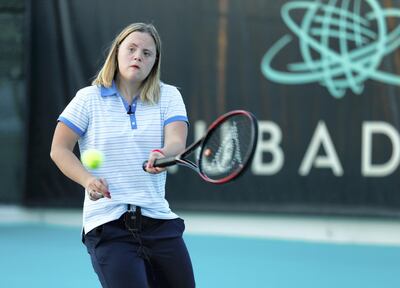Clara Lehmkuhl gets her love of dancing – and probably her love of tennis, too – from her grandfather.
Basie Pretorius died five years ago but his 27-year-old granddaughter, better known as Clari, keeps a picture of him on her bedside table.
“I know he’s looking down on me right now,” she said.
And how proud he would be. Clari, who has played tennis since she was six, is in daily training for the Special Olympics World Summer Games in Abu Dhabi next March. She is scheduled to compete as the only female singles tennis player representing the UAE.
She is also the country's first certified Zumba instructor with Down syndrome, earning her third set of qualifications at a convention of 7,500 other teachers in the US this summer.
Clari was born in Alberton, South Africa, the middle child of parents Lizette and Aart Lehmkuhl. Mrs Lehmkuhl knew right away that something was not right with her baby, because of the way her little legs would flop open during nappy changes.
It took some convincing of doctors and six excruciating weeks for the results, but it turned out that her mother was right – Clari had Down syndrome, a genetic mutation that results in physical variations as well as mild to moderate intellectual disabilities. People with Down syndrome also tend to be social, affectionate and, like Clari, dedicated.
Mrs Lehmkuhl did not wallow in the news for long, however. She got to work.
With zero in the way of government support, she enlisted volunteers from her local church to help in boosting Clari’s muscle tone.
“We worked five hours a day, five days a week,” she said.
Mrs Lehmkuhl had to teach Clari to read and write before a regular school would accept her, and when they did it was front-page news in their hometown. Having a mainstream education has made all the difference in Clari's progress ever since, her mother said.
“She learnt to lead a normal life,” she said. “That’s all I wanted for her, mainstreaming. It’s the most important thing I could wish for her.”

The Lehmkuhl family has lived in the UAE for 12 years now. Clari eventually entered the working world, first at a gym near her family’s compound, and later, for four happy years doing a secretarial job at NYU Abu Dhabi and stints at Roche and Daman as part of the Sedra Foundation’s inclusive internship programme.
Mrs Lehmkuhl contacted the Abu Dhabi gym Fitness Express, which works with more than a dozen children who have autism as well as physical disabilities. They hired Clari to teach Zumba at the Danat Complex facility this summer, three classes a week. The downside? So far, no one has signed up.
Clari keeps busy joining other Zumba teachers, instructing classes for a few songs. Fitness Express's Anastasia Aldaeva, a psychologist, thinks perhaps the city is simply not quite ready to embrace someone with Down syndrome as a fully fledged teacher.
"She has exactly the same qualifications as any teacher in Abu Dhabi, because Zumba is a unified programme," Ms Aldeava said. "She went through exactly the same programme. She's training every day."
October is Down syndrome Awareness Month, and awareness of children and adults with the condition in Abu Dhabi has grown in recent years, said Ameera Al Qubati, who founded the Emirates Down Syndrome Association, Abu Dhabi Chapter, in 2012.
_______________
Read more:
From Iraq to India: a world in one city for the Special Olympics
Dimensions Centre for special needs children saved from closure by readers of The National
Special Olympics will generate goodwill and engineer a further shift in attitudes
_______________
“They’re able to do everything you can give them, they are able to be in school and they are able to work and, like other adults, they are able to live alone,” she said. “We just need to give them trust. Society should trust them and give them their rights.”
Mrs Al Qubati tried 11 schools before she found one that would take her son Saif, 9, who was also born with Down syndrome. And even though things have improved and Saif has flourished, there are many areas where he is not accepted, including the after-school sports programmes that readily accept her other children.
The EDSA, which has more than 200 people with Down syndrome on its Abu Dhabi database, is run by eight volunteers, providing support and organising workshops and events. Its members range from parents-to-be to a 53-year-old woman from Colombia, who lives with her sister.
And while things are getting better, after Saif graduates from high school, aside from rare one-off programmes, there is really no place for him – and other Down syndrome adults living in the UAE – to go.
“It’s like a nightmare for me,” she said. “I’m always thinking how he will be, where he will be working, will he be independent?”




